Categories
Archives

“As content becomes commoditised, there will be a trend towards authentic, human-created work,” said Scott Belsky at the 2025 Content Authenticity Summit, held last week on Roosevelt Island, New York.
Over 200 authenticity experts from over 150 companies joined together at the Cornell Tech campus in New York City on Wednesday 4th June to share the latest work of those implementing C2PA in the industry.
The theme of the event was real-world implementation of C2PA and spreading the word about Content Credentials, the user-facing brand of the C2PA technology.
The event was co-presented by IPTC along with the Content Authenticity Initiative (CAI) and the Coalition for Content Provenance and Authenticity (C2PA)
Highlights were:
- The launch of the C2PA Conformance programme, which will allow device and software implementers to be able to obtain certificates on the official C2PA Trust List (after the current Temporary Trust List is shut down later in 2025)
- A talk from Bruce MacCormack of CBC / Radio Canada, Chair of the IPTC Media Provenance Committee, on how the media industry is implementing C2PA, and the importance of publisher branding and organisational stamping of content at publish time to prevent brand hijacking and misattribution of news content
- An in-depth discussion of the IPTC Origin Verified News Publisher programme, including the launch of the IPTC guidance document helping news publishers to implement C2PA
- Another deep-dive workshop looking at which metadata fields should be included in C2PA-signed content. The discussion covered both metadata about the publisher and metadata about the content itself.
- Eight simultaneous tracks of breakout sessions covering device conformance, implementation in the news industry, real-world deployments on Amazon Web Services, work on standardisation with ISO and other bodies,
- A fast-paced and wide-ranging presentation from UC Berkeley professor Hany Farid on the importance of authenticity and the difficulty of keeping up with deepfake detection in our world of ever-improving generative AI models
- The many and varied discussions among attendees around their own effort to implement C2PA technology within their newsrooms
The most common feedback that we heard from attendees was that participants would have liked to be at all of the breakout sessions at the same time!
The event was held under the Chatham House Rule, which means that detailed recordings will not be available, although anonymised workshop summaries will soon be made available to attendees.
For more information about C2PA, the Media Provenance Committee or the Verified News Publisher List, please contact IPTC directly.
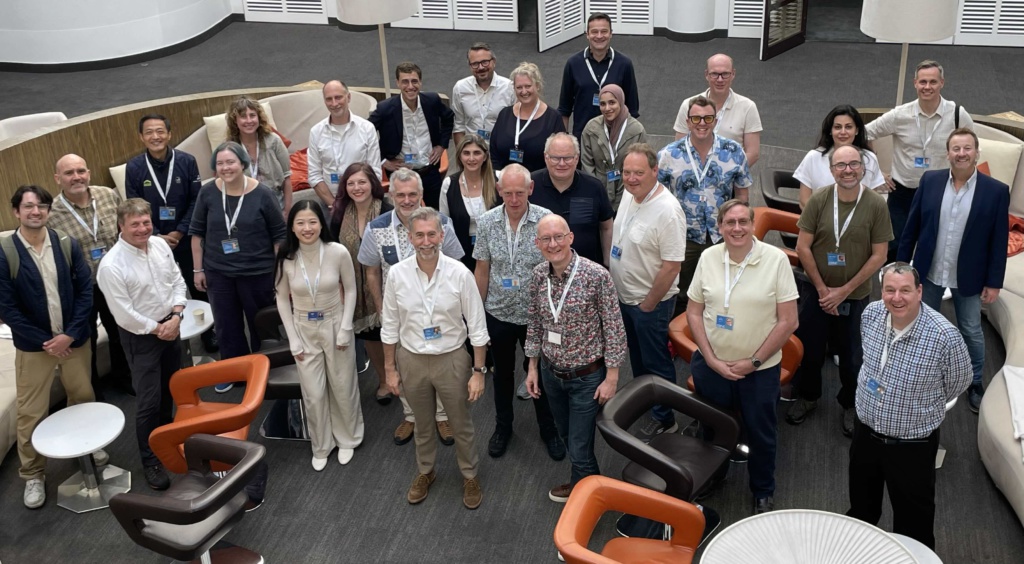
Over 60 senior technology, data and editorial staff from 43 top media companies around the world met in Juan les Pins, France and online for the IPTC Spring Meeting 2025.
Representatives from AP, AFP, BBC, Bloomberg, Getty Images, New York Times, Sinclair Broadcasting Group, Radio New Zealand, Broadcast Solutions Group, Qatar News Agency, Xinhua News Agency, Progress Software, Data Language / DataGraphs, National Geographic Society, OrangeLogic, Trufo.ai, Deutsche Welle, Profium, Athens Technology Centre and more joined us in Antibes. We discussed and shared best practices on AI in media, content provenance, knowledge graphs, AI opt-in and opt-out, and many other topics.
Highlights included:
- Julie McVey from the National Geographic Society speaking about a proof-of-concept project they undertook with their DAM vendor OrangeLogic and provenance technology provider Trufo to digitally sign their archive content
- Paul Wilton from Data Language showing how their DataGraphs product can be used to visualise sports information and link key moments to video clips, all based on IPTC’s Sport Schema model
- Invited guest Benjamin Sabbah from Reporters Without Borders speaking about the Journalism Trust Initiative, leading to a discussion about how we can create a vehicle for metadata about publishing organisations as well as metadata about individual content items
- Reports from the NewsML-G2 / News Architecture Working Group, the News in JSON Working Group and the Photo Metadata Working Group
Day 1 was held in conjunction with the CEPIC 2025 meeting, where we held panels about opt-in and opt-out for Generative AI training, C2PA and media provenance, blockchains for image archives and a hands-on workshop on photo metadata.
Members held the sort of productive discussions, debates and collaborations that can only happen in a face-to-face meeting.
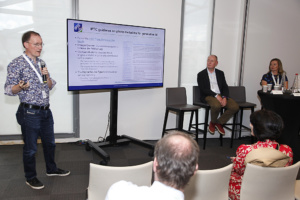
Next week, speakers from the National Geographic Society, Journalism Trust Initiative, Peking University and more will be presenting at the IPTC Spring Meeting in Juan les Pins, France.
This year’s event is being held in collaboration with CEPIC, the industry group for the image licensing industry, with whom IPTC has a long association. The CEPIC event is being held from Monday to Wednesday, and the IPTC event is from the Wednesday to Friday, so we can enjoy a crossover day where CEPIC attendees will be able to hear from IPTC speakers and vice versa.
Speakers and panels include:
- A panel discussion on AI opt-out best practices, discussing what publishers can practically do in today’s ecosystem to ensure that they have control over whether AI crawlers can index their content
- Several presentations on C2PA and Media Provenance, including a presentation of a proof-of-concept by the National Geographic Society working with Orange Logic and Trufo. We will also be holding a meeting of the IPTC Media Provenance Committee and workshops on metadata for C2PA in the news media industry
- Presentation from IPTC member Data Language on their recent work implementing IPTC Sport Schema in their Data Graphs platform
- Invited speakers from Peking University, working with IPTC member Xinhua News Agency, on pre-training AI models for media
- Presentations from each IPTC Working Group: NewsML-G2, News in JSON, Photo Metadata, Video Metadata, NewsCodes, Sports Content
Of course there will also be time for attendees to discuss shared issues in person with their peers from other companies around the globe.
Virtual attendance is still available. IPTC members should fill in the attendance form linked from the event page in the IPTC Members Only Zone.
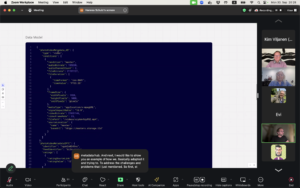
Last week we held the latest IPTC member meeting, the IPTC Autumn Meeting 2024. With over 80 attendees, it was a great success. We heard from IPTC members and invited guests on new developments in the world of media technology and metadata.
Speakers from Axel Springer, Reuters, Global Media Registry and the EBU
We heard from Axel Springer who have implemented an internal video management system based on IPTC Video Metadata Hub as a metadata model; from Reuters who are basing their live events streaming API on the forthcoming DPP Live Production Exchange (DPP LPX) protocol based on the recently approved ninjs 3.0, from Global Media Registry who are developing a “Unique Media ID” standard to identify media publishers, and from the EBU on the Trusted European Media Data Space (TEMS) project.
Committees and Working Groups
Our new Media Provenance Committee and its Working Groups are working very hard on the details for implementing C2PA in the media industry, including launching the IPTC Origin Verified News Publisher List. We also heard from Tessa Sproule of CBC / Radio Canada on their implementation of C2PA.
Our Standards Committee Working Groups are also working hard, with new developments on all of our standards and three new standard versions, as described below.
New Versions of Sport Schema, ninjs and Photo Metadata
The Standards Committee approved three new standard versions at its meeting on Wednesday 2nd October.
IPTC Sport Schema version 1.1 was approved, adding a Club class so we can model Clubs that contain multiple Teams, even teams that play different sports (who knew that Bayern Munich had a chess team?!). The update also added Associate relationships for individual athletes (such as a coach for a tennis player or a boxer), and facets for sports so we can now declare that an event was a women’s 200 metres breaststroke swimming event using IPTC facets metadata taken from our NewsCodes sports facet vocabulary.
IPTC Photo Metadata Standard version 2024.1 modifies the text of the Keywords property to broaden its scope, matching current industry usage.
IPTC’s JSON standard for news ninjs version 3.0 was also approved, adding requirements for the DPP LPX project including events and planning information, plus renditions support for live event streams. The 3.0 version of the standard also moves property names to “camelCase”, which is the de facto standard for GraphQL and many other JSON-based technologies.
All three updates, plus the NewsML-G2 v2.34_2 errata update, will be released in the coming weeks.
The IPTC is excited to announce that the IPTC Autumn Meeting 2024 is fast approaching, taking place from Monday September 30 to Wednesday October 2. This year’s event will be held virtually, providing IPTC members with the opportunity to stay informed and connected with industry leaders, no matter their location.
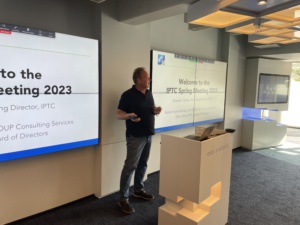
The Autumn Meeting will focus on the latest innovations in news metadata, standards, and tools that are shaping the future of digital content and journalism.
One of the key highlights of the meeting will be presentations by IPTC’s various Working Groups. These sessions will dive deep into advancements in metadata standards, addressing challenges like improving interoperability and adapting to the rapid rise of artificial intelligence in media.
Another focal point of the event will be updates on how new and existing IPTC standards like NewsML-G2, ninjs, Video Metadata Hub are helping news and media organisations to streamline the exchange of information. These tools play a critical role in ensuring that news content is delivered in a trusted and structured manner across platforms.
In addition to the technical presentations, the meeting will also feature case studies from IPTC member organizations. These will explore innovative uses of IPTC standards, such as the DPP Live Production Exchange project and the TEMS Trusted European Media Data Space.
The new IPTC Media Provenance Committee will come together to present to IPTC members recent activity in the working groups on Governance, Best Practices and Advocacy & Education around implementing media provenance technologies such as C2PA in newsrooms and media publishing workflows. We will hear from members such as CBC / Radio Canada on how these standards are helping media companies tackle issues like misinformation and content verification.
The event also includes the official IPTC Annual General Meeting (AGM), where Voting Members will participate in elections for the IPTC Board of Directors and vote on important decisions regarding the management of IPTC. The AGM is a great opportunity for members to shape the future direction of IPTC and its work on evolving industry standards.
The IPTC Standards Committee will meet to vote on proposed new standards from several working groups, including new versions of ninjs, NewsML-G2 and IPTC Sport Schema.
As always, registration for the IPTC Autumn Meeting is free for IPTC members. It’s an unmissable chance to engage with cutting-edge developments in the industry and collaborate with fellow professionals committed to improving news and media standards worldwide.
For more information and to register, visit IPTC Autumn Meeting 2024.
Tuesday’s IPTC Photo Metadata Conference was a great success. With 12 speakers from the media and software industries and over 200 people registered, it continues to be the largest gathering of photo and image metadata experts globally.
Introduction and welcome, 20 years of IPTC Photo Metadata, Recent work on Photo Metadata at IPTC
We started off with David Riecks and Michael Steidl, co-leads of the IPTC Photo Metadata Working Group, giving an update on what the IPTC has been working on in the areas of photo metadata since the last conference in 2022, along with Brendan Quinn, IPTC Managing Director.
A lot has been happening, including Meta announcing support for IPTC metadata for Generative AI, launching the IPTC Media Provenance Committee and updating the IPTC Photo Metadata User Guide, including our guidance for how to tag Generative AI content with metadata and how to use the DigitalSourceType field.
Panel 1: AI and Image Authenticity
The first panel saw Leonard Rosenthol of Adobe, Lead of the C2PA Technical Working Group; Dennis Walker of Camera Bits, creators of Photo Mechanic; Dr. Neal Krawetz, Computer security specialist, forensic researcher, and founder of FotoForensics; and Bofu Chen, Founder & CTO of Numbers Protocol speak about image provenance and authenticity, covering the C2PA spec, the problems of fraudulent images, what it’s like to implement C2PA technology in existing software, and how blockchain-based systems could be built on top of C2PA to potentially extend its capabilities.
Session on Adobe’s Custom Metadata Panel
James Lockman, Group Manager, Digital Media Services at Adobe demonstrated the Custom Metadata Panel plugin for some Adobe tools (Bridge, Illustrator, Photoshop and Premiere Pro) that allows the full range of IPTC Photo Metadata Standard and IPTC Video Metadata Hub, or any other metadata schema, to be edited directly in Adobe’s interface.
Panel 2: AI-powered asset management
Speakers Nancy Wolff, Partner at Cowan, DeBaets, Abrahams & Sheppard, LLP; Serguei Fomine, Founder and CEO of IQPlug; Jeff Nova, Chief Executive Officer at Colorhythm and Mark Milstein, co-founder and Director of Business Development at vAIsual discussed the impact of AI on copyright, metadata and media asset management.
The full event recording is also available as a YouTube playlist.
Thanks to everyone for coming and especial thanks to our speakers. We’re already looking forward to next year!
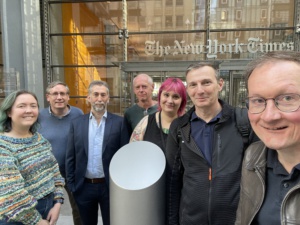
Last week, the IPTC Spring Meeting 2024 brought media industry experts together for three days in New York City to discuss many topics including AI, archives and authenticity.
Hosted by both The New York Times and Associated Press, over 50 attendees from 14 countries participated in person, with another 30+ delegates attending online.
As usual, the IPTC Working Group leads presented a summary of their most recent work, including a new release of NewsML-G2 (version 2.34, which will be released very soon); forthcoming work on ninjs to support events, planned news coverage and live streamed video; updates to NewsCodes vocabularies; more evangelism of IPTC Sport Schema; and further work on Video Metadata Hub, the IPTC Photo Metadata Standard and our emerging framework for a simple way to express common rights statements using RightsML.
We were very happy to hear many IPTC member organisations presenting at the Spring Meeting. We heard from:
- Anna Dickson of recently-joined member Google talked about their work with IPTC in the past and discussed areas where we could collaborate in the future
- Aimee Rinehart of Associated Press presented AP’s recent report on the use of generative AI in local news
- Scott Yates of JournalList gave an update on the trust.txt protocol
- Andreas Mauczka, Chief Digital Officer at Austria Press Agency APA presented on APA’s framework for use of generative AI in their newsroom
- Drew Wanczowski of Progress Software gave a demonstration of how IPTC standards can be implemented in Progress’s tools such as Semaphore and MarkLogic
- Vincent Nibart and Geert Meulenbelt of new IPTC Startup Member Kairntech presented on their recent work with AFP on news categorisation using IPTC Media Topics and other vocabularies
- Mathieu Desoubeaux of IPTC Startup Member IMATAG presented their work, also with AFP, on watermarking images for tracking and metadata retrieval purposes
In addition we heard from guest speakers:
- Jim Duran of the Vanderbilt TV News Archive spoke about how they are using AI to catalog and tag their extensive archive of decades of broadcast news content
- John Levitt of Elvex spoke about their system which allows media organisations to present a common interface (web interface and developer API) to multiple generative AI models, including tracking, logging, cost monitoring, permissions and other governance features which are important to large organisations using AI models.
- Toshit Panigrahi, co-founder of TollBit spoke about their platform for “AI content licensing at scale”, allowing content owners to establish rules and monitoring around how their content should be licensed for both the training of AI models and for retrieval-augmented generation (RAG)-style on-demand content access by AI agents.
- We also heard an update about the TEMS – Trusted European Media Data Space project.
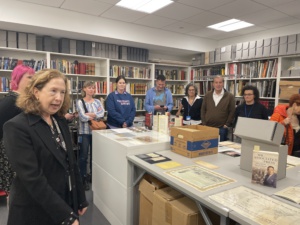 We were also lucky enough to take tours of the Associated Press Corporate Archive on Tuesday and the New York Times archive on Wednesday. Valierie Komor of AP Corporate Archives and Jeff Roth of The New York Times Archival Library (known to staffers as “the morgue”) both gave fascinating insights and stories about how both archives preserve the legacy of these historically important news organisations.
We were also lucky enough to take tours of the Associated Press Corporate Archive on Tuesday and the New York Times archive on Wednesday. Valierie Komor of AP Corporate Archives and Jeff Roth of The New York Times Archival Library (known to staffers as “the morgue”) both gave fascinating insights and stories about how both archives preserve the legacy of these historically important news organisations.
Brendan Quinn, speaking for Judy Parnall of the BBC, also presented an update of the recent work of C2PA and Project Origin and introduced the new IPTC Media Provenance Committee, dedicated to bringing C2PA technology to the news and media industry.
On behalf all attendees, we would like to thank The New York Times and Associated Press for hosting us, and especially to thank Jennifer Parrucci of The New York Times and Heather Edwards of The Associated Press for their hard work in coordinating use of their venues for our meeting.
The next IPTC Member Meeting will be the 2024 Autumn Meeting, which will be held online from Monday September 30th to Wednesday October 2nd, and will include the 2024 IPTC Annual General Meeting. The Spring Meeting 2025 will be held in Western Europe at a location still to be determined.
The 2024 IPTC Photo Metadata Conference takes place as a webinar on Tuesday 7th May from 1500 – 1800 UTC. Speakers hail from Adobe (makers of Photoshop), CameraBits (makers of PhotoMechanic), Numbers Protocol, Colorhythm, vAIsual and more.
First off, IPTC Photo Metadata Working Group co-leads, David Riecks and Michael Steidl, will give an overview of what has been happening in the world of photo metadata since our last Conference in November 2022, including IPTC’s work on metadata for AI labelling, “do not train” signals, provenance, diversity and accessibility.
Next, a panel session on AI and Image Authenticity: Bringing trust back to photography? discusses approaches to the problem of verifying trust and credibility for online images. The panel features C2PA lead architect Leonard Rosenthol (Adobe), Dennis Walker (Camera Bits), Neal Krawetz (FotoForensics) and Bofu Chen (Numbers Protocol).
Next, James Lockman of Adobe presents the Custom Metadata Panel, which is a plugin for Photoshop, Premiere Pro and Bridge that allows for any XMP-based metadata schema to be used – including IPTC Photo Metadata and IPTC Video Metadata Hub. James will give a demo and talk about future ideas for the tool.
Finally, a panel on AI-Powered Asset Management: Where does metadata fit in? discusses teh relevance of metadata in digital asset management systems in an age of AI. Speakers include Nancy Wolff (Cowan, DeBaets, Abrahams & Sheppard, LLP), Serguei Fomine (IQPlug), Jeff Nova (Colorhythm) and Mark Milstein (vAIsual).
The full agenda and links to register for the event are available at https://iptc.org/events/photo-metadata-conference-2024/
Registration is free and open to anyone who is interested.
See you there on Tuesday 7th May!

Last week the IPTC held another very successful member meeting. The 2023 IPTC Autumn Meeting, held virtually this time, had well over 50 attendees from over 30 organisations in at least 15 different countries.
Highlights included Standards Committee approval of a brand new standard, IPTC Sport Schema v1.0, plus the approval of three new versions of existing standards: NewsML-G2 v2.33, IPTC Photo Metadata Standard 2023.1, and Video Metadata Hub v1.5. We will be publishing more information about each of these updates over the coming weeks.
We also heard from two real-world projects in the broadcast industry. One has just completed and the other is still in its planning stages, but both are based on IPTC standards. The ASBU Cloud system was presented by IPTC member Broadcast Solutions, and the DPP Live Production Exchange was presented by new IPTC member Arqiva.
We also heard guest presentation from Will Kreth of the HAND talent identity platform, the latest on C2PA and Project Origin, had a demo of IPTC Sport Schema using MarkLogic from Progress Software (also an IPTC member).
All Working Groups presented their recent work, which included interesting discussions about proposed new NewsCodes vocabularies and how to address the needs of Artificial Intelligence across all of our standards, work that has been going on for years but now acquires a new urgency.
At the IPTC Annual General Meeting 2023, we voted in the existing Board of Directors for another term and and heard updates about all the great work that has taken place at IPTC this year.
It was a great event and we are already looking forward to the next member meeting, to be held in person in New York in April 2024!
The IPTC is pleased to announce the final agenda for next week’s IPTC Autumn Meeting.
Held online via Zoom from 13.00 to 18.00 UTC from Monday to Wednesday, the meeting will include:
Monday 2 October
- Working Group presentations:
- Video Metadata Working Group who will be proposing a new version of Video Metadata Hub handling metadata specifying whether content can be included in AI training data and other forms of data mining
- Sports Content Working Group who will be proposing the 1.0 version of the new IPTC Sport Schema standard
- Member presentations:
- Demo of how to implement IPTC Sport Schema in MarkLogic and Semaphore from Progress Software
- Guest presentations:
- Update from the HAND project: a new approach to identity in media and entertainment
Tuesday 3 October
- Working Group presentations:
- NewsML-G2 Working Group who will be proposing a new version of NewsML-G2 that includes Digital Source Type metadata to bring it in line with other IPTC standards
- Photo Metadata Working Group who will be proposing a new version of the IPTC Photo Metadata Standard handling metadata specifying whether content can be included in AI training data and other forms of data mining
- NewsCodes Working Group (including a discussion of a proposed new vocabulary on “editorial tone”)
- Member presentations:
- Broadcast Solutions presenting the ASBU Cloud project, based on NewsML-G2
- New member Newsbridge presenting how their systems implement IPTC standards
- Guest presentations:
- Update on Project Origin and C2PA, featuring the CEO of Media City Bergen, Helge Svela
Wednesday 4 October
- IPTC Annual General Meeting 2023
- Election of IPTC Board of Directors and Chair
- Approval of budget for 2023
- Updates from the Managing Director and Chair of the Board of Directors
- IPTC Autumn 2023 Standards Committee meeting
- Votes on new versions of NewsML-G2, Photo Metadata Standard, Video Metadata Hub and presenting proposed new standard IPTC Sport Schema
- Working Group presentations:
- News in JSON Working Group
- Working Group and member presentations:
- Discussion on a simple rights format
- DPP Live Production Exchange (LPX) project from CNN and new member Arqiva
IPTC member representatives can view the full schedule on the IPTC Autumn Meeting 2023 event page in the Members-Only Zone.
